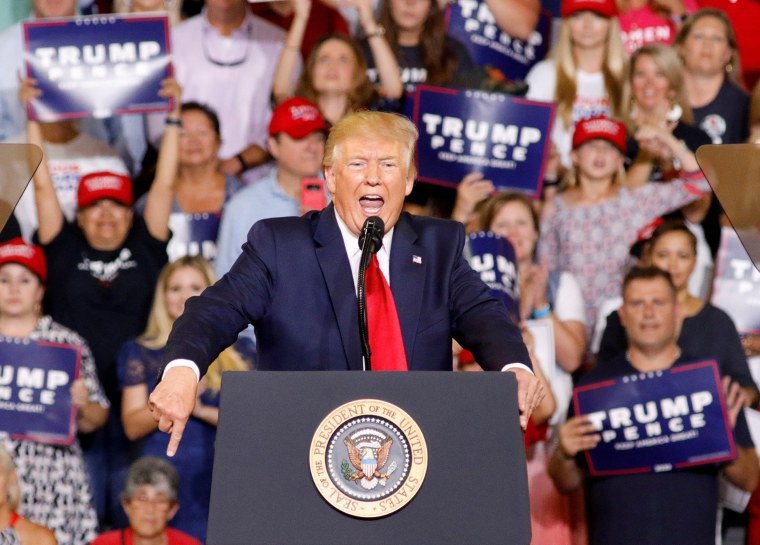With their votes this week, House Republicans absolved President Donald Trump of racism in calling for four non-white lawmakers to “go back” to other countries.
But not only Trump.
They also voted to absolve themselves, their party and the voters who elected them – like the ones who chanted “send her back” at a rally Wednesday in North Carolina. It took more than just fealty to the president to unite 187 of 191 Republicans against condemning his words.
Analysts across the political spectrum typically cite raw fear as why GOP leaders don’t challenge Trump over behavior that outrages most Americans. Rock-solid support within his party, they argue, means the president can end the careers of Republican dissidents.
“I think he’s racist,” said Mickey Edwards, a Reagan-era GOP lawmaker who once chaired the American Conservative Union. But “a relatively small number of Republicans” share Trump’s racial views, Edwards added, and simple “cowardice” explains the party’s refusal to denounce them.
Yet this week’s furor implicates the character and reputation of many others besides the president. Denouncing Trump’s words as racist, as the House Democratic majority voted to do, means denouncing those chanting rally audiences that all GOP candidates depend on.
“They’re being asked to condemn an element of the coalition,” said Carlos Curbelo, a Republican House member from Miami until a Democrat defeated him in 2018 midterm elections. For a Republican elected official, the blowback would dwarf what Hillary Clinton suffered in 2016 after calling some Trump supporters “deplorables.”
That element of the coalition looms so large because of how the two parties have evolved over the last half-century. After national Democrats decisively embraced the civil rights movement, white conservatives flocked to the GOP, polarizing American politics along racial and partisan lines as well as ideological ones.
That realignment fueled incendiary culture clashes over crime, welfare, affirmation action and immigration long before 2016. Trump accuses Rep. Ilhan Omar, D-Minn., of hating America, offering her as a symbol of Democratic radicalism; three decades before, George H.W. Bush’s Republican presidential campaign vowed to make black criminal Willie Horton the Democratic “running mate,” and sought to suggest superior patriotism by appearing at a flag factory.
Those clashes have grown harder for Republicans to win as education levels rise, attitudes change and non-whites swell as a share of America’s population. And they’ve consistently placed Republicans of whatever motivation – ideological or personal, economic or cultural, foreign policy or domestic affairs – on the defensive.
“Reagan conservatives like me have been called racists – falsely and maliciously – all of our lives,” National Review editor Jay Nordlinger said on Twitter today.
But Trump brings the question about his party into sharper focus than Reagan, Bush or Richard Nixon ever did.
Studies have shown that white populations with the strongest feelings of racial resentment – disproportionately less-educated, lower-income religious conservatives — propelled his 2016 campaign from the start. As president, he has abandoned the decorum of Republican predecessors and stoked their resentments.
Now, GOP lawmakers who have surfed overlapping currents to power fear that acknowledging Trump crossed the line would acknowledge that the rest of the party has, too.
“Whether it’s because they’re pointing the finger at themselves, or someone else saying ‘Aha!’, they don’t want to do that,” says former House GOP leadership aide Doug Heye.
By condemning Trump, “they’re condemning themselves,” adds former GOP House member Vin Weber. “They feel it validates the criticism that’s come their way for a lot of things.”
Weber, who once joined his ally Newt Gingrich in rallying the Republican right behind the “Conservative Opportunity Society,” calls some of that criticism justified. “Racism is a part of it,” he says, though “not all or even primarily.”
But it’s becoming a louder part as America draws closer to the day when white people no longer represent a majority of the population. Census officials expect it to happen by mid-century.
That demographic reality led national Republican leaders in 2013 to call for courting non-whites – and also young, female and gay voters — with a “more inclusive and welcoming” message. Trump won in 2016 with the opposite approach, and aims to do it again in 2020.
That would only delay the reckoning with societal change that the GOP sidestepped again by standing behind Trump this week.
“Parties change or evolve when they’re forced to change,” said Curbelo, a Miami-born Cuban-American. “All Republican leaders understand this is the path we have to pursue. There’s no other way.”
